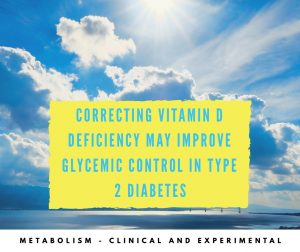
Correcting Vitamin D Deficiency May Improve Glycemic Control in Type 2 Diabetes
Metabolism – Clinical and Experimental
Low vitamin D status has been found to be associated with impaired glycemic control in patients who suffer from type 2 diabetes; however, whether vitamin D supplementation is associated with improved glycemic status remains controversial. The aim of this study was to summarize evidence from randomized controlled trials (RCTs) to assess the efficacy of vitamin D supplementation in reducing glycosylated haemoglobinA1c (HbA1c) and fasting blood glucose (FBG) levels.
* The authors of this systematic review and meta-analysis (is the statistical procedure form combining data from multiple studies) sought to determine if vitamin D supplementation influenced glycemic control in type 2 diabetes patients. The researchers found that supplementation with vitamin D was associated with lower HbA1c levels but not lower fasting blood glucose. However, in a subgroup of patients with vitamin D deficiency at baseline, supplementation with vitamin D was associated with both lower HbA1c and fasting blood glucose. Another subgroup, patients with BMI less than 30 kg/m2, also had reductions in HbA1c levels with vitamin D supplementation.
* The results of this study indicate that vitamin D supplementation may be useful for improving glycemic control in type 2 diabetic patients, particularly those with underlying vitamin D deficiency, and also individuals who are not obese
If you would like help trying to control your type 2 diabetes or think you may have low vitamin D levels, then ring Botanica Medica on 8271-1827 to book an appointment with one of our Naturopaths today. Our Naturopaths are available Monday to Friday and we do have after hours appointments available. Botanica Medica is located at 97 Glen Osmond Road, Eastwood SA
Materials/Methods
We searched PubMed, Web of Science and the Cochrane Library for reports published up to March 2017. We selected parallel RCTs investigating the effect of vitamin D or vitamin D analogues on HbA1c or FBG levels in type 2 diabetes patients. Cohen’s d was calculated to represent the standardized mean difference (SMD) for each study, and the SMDs with 95%confidence intervals (CIs) were pooled using a random effects model.
Results
Twenty-four studies were included that evaluated HbA1c levels and 18 studies were included that evaluated FBG levels. Meta-analyses showed that vitamin D supplementation was associated with reduced HbA1c levels (standardized mean difference (SMD) − 0.25 [− 0.45 to − 0.05]) but had no influence on FBG levels (SMD − 0.14 [− 0.31 to 0.03]). However, the subgroup analyses suggested that vitamin D supplementation was associated with reduced HbA1c levels (SMD − 0.39 [− 0.67 to − 0.10]) and FBG (SMD − 0.27 [− 0.46 to − 0.07]) among patients with 25-hydroxyvitamin D (25(OH) D) deficiency at baseline. Significantly reduced HbA1c levels were also observed in association with vitamin D supplementation in the subgroup including type 2 diabetes patients with a body mass index (BMI) < 30 kg m− 2 (SMD − 0.30 [− 0.54 to − 0.07]).
Conclusions
Vitamin D supplementation could be effective at improving glycemic control in vitamin D deficient or non-obese type 2 diabetes patients.
Refrences:
From PracticeUpdate
Published online May 2, 2017
chunhua Wu, Shanhu Qiu, Xiangyun Zhu, Linghi

Recent Comments